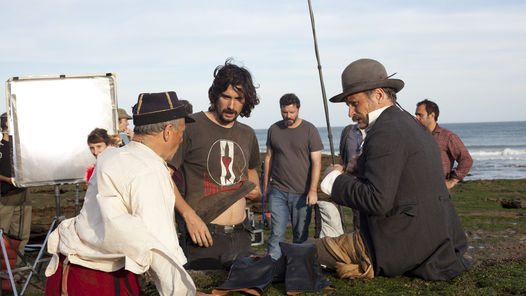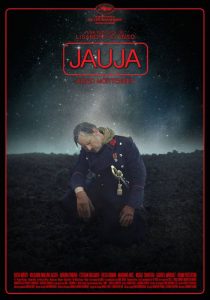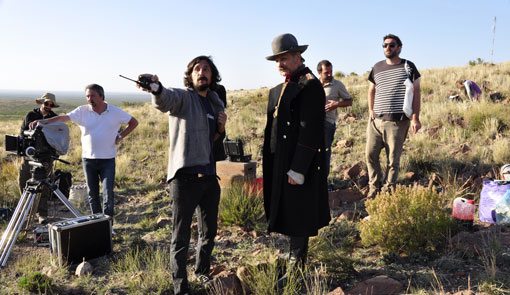

The films of Lisandro Alonso often defy classification, even though most of them have rural settings, they don’t present us with idyllic views of country life. Even though most of them feature non-professional actors playing parts that share their names, they are not social realism by any means, and even though they often seem to be flirting with documentary, Alonso always includes a wink that reminds us we are in fact watching a work of fiction. His first foray into larger scale filmmaking is certainly no exception, in the fever dream that is Jauja, he presents us with his very first period piece, set in the Patagonian desert during the 19th century, the film follows the desperate search conducted by a Danish engineer (Viggo Mortensen) after his daughter (Viilbjørk Malling Agger) runs away with a soldier.
Lushly shot by Timo Salminen (Aki Kaurismäki's most well-known collaborator) the film continues exploring the themes that have haunted Alonso throughout his filmography, particularly observing how man reacts in the middle of nowhere like he did in La Libertad, and how oppressing the openness wilderness can be for those carrying dark demons, as he explored in the chilling Los Muertos. Despite the larger production and the presence of Mortensen, Jauja undeniably remains a Lisandro Alonso film, maddeningly beautiful, funny, and profound without trying too hard. We had the opportunity to talk to the brilliant filmmaker on the eve of the film’s commercial release.
 I saw Jauja at the New York Film Festival and right after I saw it I tweeted that I thought it was a masterful existential comedy, which had many people asking me if I was crazy, since there was nothing funny about it.
I saw Jauja at the New York Film Festival and right after I saw it I tweeted that I thought it was a masterful existential comedy, which had many people asking me if I was crazy, since there was nothing funny about it.
Well, that’s a way to see it, the film certainly has many funny moments, it’s not a solemn, serious piece by any means. But what exactly did you find funny?
The tone for one, it was full of anachronisms…
Yes, I wasn’t trying to abide to the history books, instead I wanted to create a specific reality for the film. That’s why we didn’t give the natives a particular look, their tribe has no name, and we also gave the characters a very theatrical manner of speaking. We also gave the characters very particular names, we weren’t trying to be faithful to any historian.
Precisely, for example you name one of the characters Malaespina (Spanish for “bad feeling”), another one is called Corto (Spanish for “short”) and the English subtitles didn’t catch these little quirks, which made me feel that more than with any other of your films, this one had vocabulary elements that got lost in translation.
Yes, you’re right about that. I think that has a lot to do with the screenplay’s co-writer, poet Fabián Casas, who names his characters after his classmates in school, which is why they have such strange names. So I asked him if he thought the names he was giving the characters were too modern for a period piece, but he said “should we give them Castilian names? Let them stay like this, they’re just names after all”. He also likes to combine ideas and different timelines.
The names reminded me of pulpy Sam Spade-like novels in which we were given clues, but your films have never been known for giving the audience any clues…
Jauja mutates, it begins with characters that eventually disappear, leaving Viggo’s character alone, there’s also the dogs, the cave...even today if someone asked me what the film was about I wouldn’t know how to begin. The best I can say is that it’s about a father trying to find his daughter, but I think the film goes beyond that, it’s not easy to describe using words, but I feel if you see it things make sense, or perhaps they don’t.
Viggo Mortensen said that he basically felt he was playing his father, how did the two of you develop his character?
He mentioned that right after reading the screenplay, because he said this experience was similar to what his father had lived through when they moved to Argentina when Viggo was 11. He was a Scandinavian man trying to get his thoughts together in a strange new land, with locals he didn’t completely understand. Viggo remembered this and it influenced the way his character spoke, including his accents and mannerisms.
This is the first time you’ve directed professional actors, how was this different than directing the actors in your other films?
The main difference is that non-professional actors who are playing themselves or someone very much like themselves, don’t really know how the cinema apparatus works, so they would never ask you why the camera is in said place, or why they should be coming in through here and not there. While Viggo knows exactly what to do with his face in front of the camera, so he wants to be much more involved in the lighting, the costumes and wants to know what kind of shot will it be. I wasn’t used to being asked all these questions, because in the past all I had to do was say things like “Misael, you need to walk there and cut the tree”, and while they got used to my directions, I’m not sure if even by the end of shooting they really understood the whole system. Sometimes these actors had never even been to the cinema before. Because Viggo had done so many films, I ended up learning a lot from him, thanks to his involvement in helping us make our decisions, I think we got the best out of the shoot.
You also use Misael, from La Libertad, in the film…
Yes, I wanted to have him around.

I might be over-analyzing, but I’ve read interviews in which you talk about each of your films as if they were the very last thing you’d do. Does using Misael in Jauja mean you’re putting an end to the cycle that you began with La Libertad?
More than anything I think Jauja announces the beginning of a new cycle, a way for me to work with elements that are completely new to me. I think having Misael in the film was just a way to have him become part of this new cycle which has a Finnish cinematographer, Danish actors, a multilingual script...I didn’t want to miss the opportunity to include my friend Misael in this, because we both started making movies at the same time. It seemed like a dream to think that in 2001 Misael was working in the middle of La Pampa, so having the opportunity to have him work with the actor who was in The Lord of the Rings filled me with joy. We never thought La Libertad would take us to anything, so it was important for me to share this with Misael. Who knows what the future will bring, I like to surprise myself. You’re right, I do feel like I’m always trying to make “one more movie”, but I don’t know if it’ll happen or when. There was a six year gap between Liverpool and Jauja, time during which I worked in the country and didn’t do anything related to film, I’m not the kind of person who has three or four projects to choose from, I go on a one-by-one basis, and if you ask me now if I have a project the answer is no. I have some ideas, but I’m in no rush to make films out of them. I can assure you that once the time arrives, I’ll work with the same passion with which I did my other films, but I’m not desperate to start shooting again. Mostly because I had so much fun making my last film, that I’d like to bask in the satisfaction I got from making it. Jauja is definitely not a film for multiplexes, I’m not stupid, so I know just because Viggo Mortensen is in it, it won’t be the new Lord of the Rings, but it did give me the opportunity to show my film in more movie theaters, much to the horror of some people (laughs) but hopefully others discovered a new kind of cinema they don’t ever get to see.
All of your films before Jauja are about people who live on the margins of society, although you’re not making social or documentary films, would you say you’re trying to remind us that these people exist and that their stories are just as important?
Yes, I think if I try to remind myself about it, the people who saw my other films gets to remember them with me, which brings us together. It’s also a way to remind myself that just because I get to work with professional actors does not mean I’ll radically change my way of making films. I chose a particular, personal way, that now has opened up to professional actors, but this doesn’t mean that tomorrow I won’t go back to making films with complete unknowns who maybe have never been to the movies, or own a television set or a cell phone. It all depends on where we can go put a camera and a microphone, and I like taking my camera and microphone to places people don’t usually go to.
Jauja is now playing in select theaters. Read our review here.